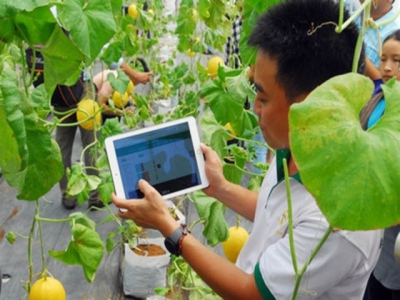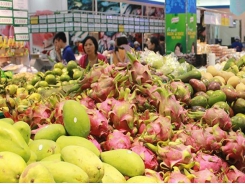Vietnam should apply new tech to agriculture: experts

Vietnam should apply scientific and technological advances and develop a knowledge-based ecosystem that closely connects stakeholders in the agriculture sector in a bid to build smart agriculture, speakers said at a seminar in Hanoi City on August 21.
The Ministries of Agriculture and Rural Development, Planning and Investment, and Science and Technology co-organized the seminar, which was aimed at finding solutions for the smart and sustainable application of science and technology in the development of the agriculture sector.
Local scientists and experts as well as overseas Vietnamese intellectuals attended the seminar to examine Vietnam’s agriculture sector and highlight the opportunities and challenges in technology application over the course of international integration.
Deputy Minister of Agriculture and Rural Development Le Quoc Doanh said that agriculture is one of the most important economic sectors of Vietnam, comprising more than 15% of the country’s gross domestic product (GDP) in 2017, up by nearly 3% against 2016, with many high-value export items.
However, the agriculture sector faces multiple challenges, such as climate change, frequent droughts and floods and small-scale production, Doanh added.
Compared with the other sectors, agriculture has distinct advantages, according to Nguyen Do Anh Tuan, director of the Institute for Policy and Strategy for Agriculture and Rural Development.
Tuan cited an assessment of the World Trade Organization, which indicated that the support level for agricultural producers in Vietnam is as low as 7%, mainly in irrigation, compared with 20% in the member countries of the Organization for Economic Cooperation and Development and a staggering 60-70% in South Korea and Japan.
Despite little support, agriculture frequently generates an export surplus in goods, worth roughly US$40 billion, while most of the other sectors tend to send the trade balance into deficit, he noted. Therefore, speeding up the application of science and technology in the sector could transform Vietnam into an agricultural power.
The director further explained that the downward trend in the sector’s growth started in 2010, as the advantages in land, labor and fertilizers eventually petered out.
He said high-tech agriculture accounts for a mere 0.2% of GDP, compared with an average of 0.4% in regional countries, particularly 1-2% in Thailand and Malaysia.
The application of technologies, such as the Internet of Things and Big Data, has ample scope for growth in the agriculture sector, according to him.
He underlined the need to enhance the quality of manpower in rural areas, as the low levels of laborers have affected their access to scientific and technological advances.
Meanwhile, Nguyen Hoang from the U.S.-based University of California, Davis, pointed out a paradox that while high-quality and cheaply priced farming products are in demand, most of the agricultural cooperatives and other businesses cover various costs and have limited access to bank loans.
Hoang suggested that the representatives of cooperatives and businesses be allowed to join research and investment funds, appraisal processes and workforce training systems in the long run with the aim of creating a chain in the smart agricultural ecosystem.
In developed countries, universities, private firms and centers of the agricultural ministry are responsible for developing agricultural technology, he said, stressing that it is crucial to design a knowledge-based agricultural ecosystem to keep pace with the Fourth Industrial Revolution.
According to the overseas intellectual, the Vietnamese Government should allow firms and foreign experts to join the appraisal and selection procedures for agricultural projects to increase the practical utility of their products.
Many experts suggested that Vietnam should actively establish partnerships with countries that take the lead in science and technology, such as the United States and Germany, in an effort to access new technological advances and speed up technological transfers.
Có thể bạn quan tâm
Phần mềm

Phối trộn thức ăn chăn nuôi

Pha dung dịch thủy canh

Định mức cho tôm ăn

Phối trộn phân bón NPK

Xác định tỷ lệ tôm sống

Chuyển đổi đơn vị phân bón

Xác định công suất sục khí

Chuyển đổi đơn vị tôm

Tính diện tích nhà kính

Tính thể tích ao hồ



 Design a crop cover strategy
Design a crop cover strategy  Agro-forestry-fishery exports generate US$22.2b in January-July period
Agro-forestry-fishery exports generate US$22.2b in January-July period